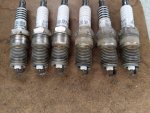Montanomo Bay
Member
Hello, I have a 2006 3.0 that has a nagging misfire and o2 sensor problem. I have done all of the following:
New plugs
New wires
New coil pack
New O2 sensor
New fuel filter
New injectors
Compression test: cyl 6 @ 105
The o2 sensor keeps causing a solid check engine light, even though it's new. I have a crack in my driver's side exhaust manifold, but not sure if this is causing the misfire as well. I'm going to swap it out after tomorrow. I will update on if this resolved P2272 issue.
Regarding the misfire, I just had the heads replaced about a year ago. I don't expect this to be the issue. Also, I've had some recent shenanigans with the crash detector switch cutting off fuel to the engine for no apparent reason. I just need to reset the switch when it happens, then I'm good to go. Otherwise, I have a random flashing cel, things get shakey, I lose power, then give it some gas and it comes back to normal.
After replacing all of the parts listed above, the truck runs GREAT!!! I just cannot shake these codes.
Please let me know if I can provide any additional information. Thanks!
New plugs
New wires
New coil pack
New O2 sensor
New fuel filter
New injectors
Compression test: cyl 6 @ 105
The o2 sensor keeps causing a solid check engine light, even though it's new. I have a crack in my driver's side exhaust manifold, but not sure if this is causing the misfire as well. I'm going to swap it out after tomorrow. I will update on if this resolved P2272 issue.
Regarding the misfire, I just had the heads replaced about a year ago. I don't expect this to be the issue. Also, I've had some recent shenanigans with the crash detector switch cutting off fuel to the engine for no apparent reason. I just need to reset the switch when it happens, then I'm good to go. Otherwise, I have a random flashing cel, things get shakey, I lose power, then give it some gas and it comes back to normal.
After replacing all of the parts listed above, the truck runs GREAT!!! I just cannot shake these codes.
Please let me know if I can provide any additional information. Thanks!













